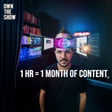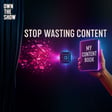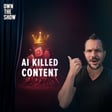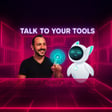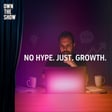Become a Creator today!Start creating today - Share your story with the world!
Start for free
00:00:00
00:00:01

How AI Agents and Custom GPTs Are Transforming Marketing Workflows and Strategy
In this AI marketing podcast episode, Dan Sanchez dives into the “Faster, Better, Smarter” framework for applying AI in everyday marketing workflows. Speaking with a fellow AI-savvy marketer, Dan shares practical ways to harness AI for real productivity gains, smarter strategies, and enhanced personalization. He breaks down how marketers can use AI to analyze data faster, improve content relevance, and even create their own internal AI coaches and brand bots. If you’re unsure where to start with AI—or want to take your usage to the next level—this is the episode for you.
My Favorite AI Tools:
- ChatGPT - https://openai.com/
- High Level Marketing Platform - https://danchez.com/highlevel
- AI Podcasting Tools - https://danchez.com/podtools
- n8n AI Automation Platform - https://danchez.com/n8n
Resources Mentioned:
- Social Media Examiner - https://www.socialmediaexaminer.com/
- HighLevel CRM - https://danchez.com/highlevel
- Infusionsoft (now Keap) - https://www.keap.com/
- Michael Hyatt / Full Focus - https://fullfocus.co/
- Flight New Media - https://www.takeflyte.com/
- Agents of Change Podcast: https://www.theagentsofchange.com/podcasts
Timestamps:
- 00:00 – Intro: Why AI is still intimidating for many marketers
- 03:00 – The “Faster” tier: Finding repetitive tasks ripe for AI
- 06:30 – Example: Automating survey reports to reclaim human creativity
- 09:00 – The “Better” tier: Using AI to personalize experiences at scale
- 12:00 – Case study: Hyper-personalized AI course content using CRM + AI
- 13:30 – Using AI to incorporate real customer voice into content
- 14:50 – The “Smarter” tier: Turning AI into your personal or team coach
- 20:00 – Custom GPTs vs. Prompt Libraries: Which to use and when
- 24:00 – The “Brand Bot” system: How Dan sets up every new client
- 26:00 – How agents are about to change marketing operations forever
- 30:45 – Final advice: Start building small custom GPTs now to get ahead
Transcript
Introduction and Purpose of AI in Marketing
00:00:00
Speaker
Hello and welcome back to the AI Driven Marketer. I'm Dan Sanchez, my friends call me Danchez. And today I'm syndicating an episode that was recently published on the Agents of Change podcast about practical ways you can use AI in your marketing today.
00:00:14
Speaker
ah They did a great job in interviewing and pulling a lot of great tidbits out of me around how AI can be a implemented anything your business across AI, across different components of AI that I haven't talked about here on the show before.
00:00:27
Speaker
So without further ado, here's that episode from the Agents of Change podcast. Make sure to go subscribe to them over in your favorite podcast app. My next guest is the senior AI marketing strategist at Social Media Examiner, where he makes AI less intimidating and more practical for marketing leaders like you.
00:00:46
Speaker
With over a decade in the game, he's all about helping marketers work smarter, not harder, using custom AI solutions. When he's not talking bots and strategy, you'll find him running, homeschooling his kids, or diving into his next big idea.
00:01:00
Speaker
Today, we're going to be looking at practical uses for your AI in your marketing with Dan Sanchez. Dan, welcome to the podcast. Thanks for having me on.
Marketers' Initial Skepticism and Acceptance of AI
00:01:09
Speaker
Now, even though we've had ChatGPT around for a few years, there's still plenty of business owners and marketing leaders who are skeptical skeptical about AI, similar maybe to how they looked at social media 10, 15 years ago.
00:01:23
Speaker
What are some practical ways that you feel marketers can start incorporating AI into their daily workflow? It's always hard when there's a new thing on the table and it's like a paradigm shifting thing. It's not just slightly better, slightly faster way of the way we used to do things, but AI is presenting a whole different smorgasbord in front of us.
00:01:44
Speaker
I remember when social media became a thing, like business owners were like, I don't see how posting about what I ate for lunch is going to help move the needle for my business, which is right. But it it kind of took us a while to figure out like, how do we actually apply this
Framework for AI Utilization: Faster, Better, Smarter
00:01:58
Speaker
thing? And now, and then it took time and people, smart people like, like Michael Stelzner and Pat Flynn, like we're wrote blogs and figured out how to like, Oh, we can, we can answer our people's questions and then post that to social media and then it can help.
00:02:11
Speaker
Right. Um, But now with AI, we have a whole new thing and we're trying to figure out how to best leverage it. So even though it's been out for two years, well, like we're still figuring out all the use cases. Some of those ways have kind of been self-evident, like, oh, like we write lots of content. Maybe ChatGPT can help us write some of that content.
00:02:29
Speaker
But I find that with most people, i you got to break it down into baby steps. You got to start ah with you know crawling before you can get up and start walking before you can actually take on a full on sprint. Like you just can't expect to go from like laying on the floor with AI and then running as fast as you can down the field.
00:02:48
Speaker
So I found that if people take it and use AI solutions to do what they're already doing, they can essentially just go faster or improve the the quantity of what they're doing.
00:02:59
Speaker
And then they can use it. Once they've done that for a while, they can use it to do better and actually improve the quality of what they're doing. And then when they've done that for a while, they can actually start to learn how to get even more out of AI by becoming smarter and getting AI to essentially not only just do your work faster and better, but actually start coaching you and making you better.
00:03:20
Speaker
All right, I love that. And I know you've got that framework of faster, better, smarter. So let's take those one at a time. So faster sounds like it's the lowest hanging fruit. It's the first place for people to start.
00:03:32
Speaker
If we're just getting started with AI, what are some of the easy ways that we can start doing our job faster using some of the AI tools that are available to us now? Sometimes people are doing the same things over and over again. In fact, we do this throughout our lives, right? We are creatures of habit.
00:03:49
Speaker
We do the same things in the morning. we We do this. We get dressed. We brush our teeth. We usually do them in the same order. Shoot, you go through the the shower and you probably like wash your body or wash your hair first and you do it the same way every time. We are creatures of habit and we do it with our work.
00:04:04
Speaker
So the first thing I usually do when I sit down with something, I'm like, dude, what are you what are you working on like on a daily basis? like What's a daily task you have to do? Interesting. And I move on and go, okay, let's write that down. what What are you doing on a weekly like ritual? like What are you doing every single week? Do you have to write a rap report? Do you got to go and check something? Do you have to post this thing? like What are you doing monthly?
00:04:26
Speaker
quarterly, maybe even annually, but I try to take inventory of all those different things and be like, which one is the biggest pain to you? Which one takes the most time? And all of a sudden you find ah out of that whole list, you'll start to find some pain points of things that are reoccurring that you can't, you you can't you couldn't have already automated it. maybe Maybe you could have automated it and you should have done it a while ago.
00:04:46
Speaker
ah Maybe it's something you can't eliminate. You have to do it. You can't automate it. You can't delegate it. You're like, okay, this
AI in Action: Automating Tasks and Cautionary Notes
00:04:52
Speaker
might be an opportunity for AI. So you start to pick apart the thing and then you break that down into baby steps. Whenever you do this weekly task, for example, maybe you have to write a report.
00:05:03
Speaker
Where do you get the information from the report? what How do you analyze the report? Where do you then document this? And then who do you send it to? You start to break down the task and you start to find like, hey, some of this can be done with AI. Oh, that's a time consuming part.
00:05:19
Speaker
You know what? If we actually copy and paste it and drop it into chat GPT, we might be able to speed up the analysis. Not that you're not looking at and it, but AI might be able to take a first pass and speed up what you would have found and maybe even find something you might've missed.
00:05:32
Speaker
um That's an example of just taking like a weekly item off of someone's plate and speeding it up. It's something they're already doing, maybe doing it ah Manually, you know i remember interviewing a guy where the he he was just bringing insights from a survey that a few hundred people were filling out, and he would have to summarize it in the Excel sheet and then actually provide a weekly report to the higher-ups on all the different survey fills. So they wanted to stay on top of it, which is a great practice.
00:06:02
Speaker
Yeah. AI has automated it completely. So he engineered it So every time ah new survey comes in, it summarizes the sections and then does a summary of all the summaries in order to instantly create a weekly report of it.
00:06:14
Speaker
So now he can get into actually diving in deeper and making the most of those insights and pulling them into the marketing because oftentimes they read a report and kind of it inform their guts, but not actually work it into the marketing. So now he's spending more time doing that.
00:06:26
Speaker
So that's an example of where you can use AI to go much faster, to free you up to do... the things that only you can do to do the things that I honestly, it actually makes you more human because you can spend the time doing the stuff that you couldn't do instead of spending more time doing the manual monotonous stuff.
00:06:43
Speaker
I can spend more time actually engaging with my audience on social media, for example, in the comments and actually have real human conversations. And if just to put out a warning, that would be something I would never automate for all of you out on LinkedIn, automating all your bot comments. It's obvious to everybody. It's not working.
00:07:01
Speaker
Yeah. Especially because you're probably having a better conversation, your bot's having a conversation with somebody else's bot and really nothing is getting done. um I do love your example though, and I had a very similar situation when it comes, because better is, or rather faster is really about productivity.
00:07:17
Speaker
And as an example, we had to review a whole bunch of ah surveys for a client, which normally we would have had to go through by hand, ah just like hundreds of different people answering like the same 10, 15 questions.
00:07:30
Speaker
And with AI, we were able to have it quickly analyze it, give us some of the overall sentiment and also pull out specific quotes that were worth reviewing as humans and kind of like to be able to pull this like, what are the best quotes? What should we be looking at? So that's going to make us more productive. It's going to make it's going to make our jobs go faster or the the specific tasks we have.
00:07:53
Speaker
So fantastic.
AI for Personalization and Content Creation
00:07:54
Speaker
Love it. Let's talk about how we can actually use AI to get better at our jobs. Man, this is when it starts to get fun because AI is different. So it starts to unlock new possibilities that you just couldn't do before.
00:08:07
Speaker
I remember when I got deep into Infusionsoft, because again, I was trying to make everything faster. I was trying to automate everything. It's like this small business marketing automation platform. They're one of the first ones to do like drag and drop journey builders in their system.
00:08:18
Speaker
I had automated it to its fullest extent. I maximized it even to the point where people were like, this feels a little robotic. I had to pull it back. It went too far. um But with AI, there's whole new possibilities of what we can automate and still make really good.
00:08:33
Speaker
For example, like if I was doing, and I recently put out a ah course um on the AI fundamentals to take people from just dabbling with chat GPT to getting really good outputs, like getting to the point where they could just one shot at one prompt to get exactly what they want.
00:08:46
Speaker
um So I did a typical five video, five day email course. you know there's ah It's sprinkled out over five days, one email, that the video is embedded until you click through, watch the video.
00:08:58
Speaker
So that is cool. And if I wanted to use AI to make it faster, I could have had a little summary of each lesson in the email. Cool, that's faster, not bad. Could have done that by hand, but AI could do it faster based on the transcript lesson. Ah, but if I wanna make it better,
00:09:12
Speaker
Now I can use my um CRM marketing automation platform called High Level. And I find that HubSpot and a lot of the ah marketing automation platforms are building this in natively now.
00:09:23
Speaker
I can actually collect some information about the students taking this little mini course. And in this case, I'm taking their job title, ah what what audience or what market they serve and what their product is, just those three pieces of information.
00:09:37
Speaker
So then I take the transcript of the video lesson, which they can still watch the video, but in the email itself, I'm actually giving back custom action steps based on those three pieces of information.
00:09:48
Speaker
So now every single lesson is customized, hyper-personalized just for them. Because the lesson's going to look very different if you're the CMO of a beauty company ah versus if you're an email marketing specialist selling accounting software to accountants, right? that the custom The action takeaways are going to be different how they might work it into their their daily lives.
00:10:11
Speaker
So that's an example of how something's getting better. And now I set that up. i so I set it up last summer. I forgot about it. But hundreds of people have now gone through that course and gotten highly actionable, personalized thing. um And it becomes a bonus part of the lesson of like, look what AI can do.
00:10:24
Speaker
um so that's an example of better. Hyper-personalization is almost always better if you do it right and do it with the right right places in in in your workflow.
00:10:36
Speaker
I love that idea because you know we often talk about putting together best practices docs for our clients. And A, I'm concerned that they actually don't read them because who wants to read best practice docs?
00:10:49
Speaker
But if it was instead customized where, hey, i listen I know that you're in the manufacturing arena, or I know that you're in the healthcare arena, and having an AI write an example based on your course that's specific to those industries, I could see how that would be much more valuable to the end user. And again, once you've set these automations up, used AI or used your CRM, like you mentioned, that process becomes automatic.
00:11:15
Speaker
And of course you can go in and improve it over time, but the bottom line is now, You've taken care of that and it's happening on its own. As you said, you almost forgot about It it was running on its own. You were off doing other things, becoming faster, better, smarter.
00:11:26
Speaker
All right. So that's better. Let's go into the third pillar, which is smarter. Before go into the third pillar, I do want to offer yeah one more example because there's there's going to be so many more case studies of this, but I find that I'm always hungry for more case studies. Like what have people done to make things better, not just faster?
00:11:42
Speaker
um But one thing that I'm working on right now is actually incorporating all my customer testimonials, nice things that people have said about me, and I just have them in a big file. You can attach that to a custom GPT, for example, is just a file or maybe a custom GPT project or a cloud project.
00:11:58
Speaker
And every time you make content, you can always reference and be like, oh, and go find some relevant client testimonials that speak to this thing. It's not something you would have done before because you'd have to go and scan a thousand different records and the keyword search isn't quite right because, but AI can go through them all, look for the right intent and then pull them in as you need.
00:12:17
Speaker
So every time you're writing a blog post about your product, every time you're doing a product any any type of product marketing. You could be pulling in actual words. You could say, hey, use the language that my customers use when describing this thing and then just go pull it from the data.
00:12:30
Speaker
It's not something that you could do easily and therefore most people just kind of skip it That's why personas are good. So kind of like ah like just summarized versions of all that data. But now you can just pull directly from the data. Like the personas are still good, but now you can just pull directly from the customer's mouths themselves whenever making your product marketing content.
00:12:48
Speaker
And that's another example of how I can use use this stuff to get better when writing a blog post or social updates or making a webinar and scripting it. So I'm thinking those are like small little ways that you can get better. the The course is a good one too, though. That one is a little bit more of a lift.
00:13:04
Speaker
um But I will say like anytime you can do hyper personalization, it's good too, because you can kind of, ah you do the work up front, but now it's it's set and forget. That thing's just operating without me now. Right.
00:13:15
Speaker
Brilliant. All right. Now I'm ready to learn about how AI can make me smarter. Yes.
AI as a Coach and Business Decision Tool
00:13:20
Speaker
Hit me. Smarter. um i One of my first things that I did when I started digging deep into AI, this was not quite possible, but now it is.
00:13:30
Speaker
um by it's It's my first failed attempt at building a custom GPT. It was December of 2023. And i was like, though I saw the writing on the wall. like, AI is going to be a thing. And I had just gone through this like kind of course from Michael Hyatt from Full Focus about how to like build your best life kind of a thing. And it walked me through all my core values and my mission and all these things and goals and all that kind of stuff.
00:13:53
Speaker
So I just finished all this stuff and I put it all into a custom GPT, all the docs that I had created. And I'm like, okay, your goal, custom GPT, is to be my life coach. Keep all these things in mind. Here's my mission. Here's my core values.
00:14:06
Speaker
ah here's I want you to lead me by asking questions. I give you a problem. You help me think through it by asking questions. Honestly, at the time, it couldn't do it. ah just It would try to come up with answers rather than ask questions. it would If it asked a question, it asked multiple questions instead of just one at a time.
00:14:25
Speaker
I literally just tried that same GPT again, and it's working. It's like, even though we're still on the four model, it's gotten much better and it can actually execute this. so AI can lead you as a coach, as a consultant.
00:14:38
Speaker
um So you tell it what kind of coach or consultant you want it to be. You give it the data and say, hey, how can I make this better? What considerations am I missing from this thing I'm trying to accomplish? And you can even go big, big objective of like, hey, I'm running into this problem. I'm not even sure I know how to define it, but here's what I know.
00:14:57
Speaker
Coach me through this, only ask one question at a time and help lead my thinking through this problem. And you'll find that ChatGPT is a very capable coach.
00:15:08
Speaker
The one drawback to this is that it's not like a human coach that can intuit things that it wouldn't know to intuit from the situation. Like you might, write like it might not intuit that like, huh, it sounds like you're not getting enough sleep, even though you've only been talking about work, where a human coach will be like, you look tired.
00:15:26
Speaker
I think that's your problem. how How's your, do you work out? like right You seem run down, but I don't think it's a work problem we're dealing with. A human coach will be able to make that connection. AI can't yet, but you'd be surprised like how much of us actually hire coaches and consultants. They think through problems sometimes, but not nearly as much as we could probably leverage. But with ChatGPT,
00:15:47
Speaker
We can. If you're an email marketing specialist, you can now have it coaching you on your emails and giving you feedback regularly. if you're a a ah If you speak for a living and speak in public or do podcasts like this, you can have ai um look at your transcript and provide feedback on where you could have tightened it up and provided better illustrations.
00:16:08
Speaker
And that's an example of using AI to make you smarter, though i start I'm starting to build it more even into the custom GPTs that I'm using into all the different areas and automating it so that it can actually help me get smarter, faster and more regularly.
00:16:23
Speaker
I love that whole idea. And I think I mentioned it with another one of my guests recently, but along those same things, I didn't think of the life coach approach, but I started to create an entity for my company, Flight New Media, based on all the things that I wanted Flight New Media to be able to accomplish.
00:16:39
Speaker
uh our my mission my values like where i want to see how flight can help other businesses and other people and just be a force for good in the universe and i basically have started to create a custom gpt around this so that i can query it and ask you questions is this the right direction for us if if this is the fork in the road like what advice as the company the entity of the company would you give me to make sure that we're staying on track so I think that just being able to bounce ideas off of AI, even if AI is far from perfect, sometimes it's just a good mental exercise. Sometimes you just need to talk it out. And if you create these AI, these custom GPTs, I think that's a great way to do it, which is a great segue because I do want to kind of talk to you a little bit about custom GPTs or Cloud Projects or Gemini Gems, whatever whatever your preferred flavor is.
00:17:30
Speaker
How do you determine... whether you should create a custom GPT for something versus just a really good prompt stack. Do you have like a ah mental trigger in your mind where you're like, this really is gonna be custom GPT versus I think I can create a series of of really well-crafted prompts to attack this problem.
00:17:52
Speaker
I almost always go the custom GPT route. Really? Okay. I hate having a prompt library. i don't want to have to copy and paste it. If I find that I'm asking AI, if i'm i'm I'm having to load a really long prompt more than once, I'm almost always going to make a custom GPT to do it.
00:18:11
Speaker
Um, now ah it's funny. I'm um'm recording an episode on this now for my, my podcast, uh, AI driven marketer about how to stack, um, information and how to customize chat GPT specifically, but you could do this with any of the models across the account because there's different ways to customize it.
00:18:28
Speaker
um You can customize it at the account level, right? Which gets applied to all custom GPTs, all projects and all chats, right? And it has custom instructions, which changed recently. If you haven't been in the custom instructions at GPT, it's it's more nuanced now.
00:18:41
Speaker
um It asks you, what's your name? How do you want to address you? What want to know about you? um How do you want chat GPT to behave? Do you want to be witty? Do you want to be... I'm skeptical of what you do.
00:18:53
Speaker
Do you want it to challenge you more? You put it there and then you can load it up with like random custom instructions. For example, the custom instructions, i every time I ask ChatGPT to write a blog post, I almost always have like five major points. And I'm like blog posts should always be x y z It should always have multiple types of chunks, broken up, bulleted list, headers.
00:19:12
Speaker
It should always be written in the first person directly to the reader. Like there's always multiple things that I do with the blog posts. I don't care which custom GPT I'm using across clients, across employer, personal stuff. I always want it this way.
00:19:24
Speaker
So I load that in the custom instructions. It's at the account level. There's also the memory feature, all the little things that it remembers about you. i have There's different ways to load that up with helpful things. um But then custom GPTs, I always arm with information about like like if you have client projects, you don't want a client project information loaded in across the account. That wouldn't make sense. You don't want to cross contaminate different projects you're working on.
00:19:49
Speaker
That's when you use custom GPTs or projects um in order to organize that information at the instruction level so you don't have to keep retraining it on the basics. Oh, this is who this company is. This is their products. This is their market. Here's their audience. and I'll act accordingly.
00:20:01
Speaker
i I get tired of reminding it of all that stuff. So I generally have a lot of custom GPTs and projects laying around um to keep those things separate and keep the chats simpler.
00:20:13
Speaker
So your advice for agencies or any company that's going to work with multiple people or multiple businesses is that we should be creating custom GPTs for each one of those businesses to, as you say, avoid that cross-contamination.
00:20:27
Speaker
Yes. um and I have two different custom GPT styles that I use. And this this gets more complicated with projects, but there's there's essentially two GPTs that I that i build. one There's general GPTs and there's specific GPTs. The general ones are...
00:20:43
Speaker
You know, general, you could do a lot with them. Every client that I have or employer that I have, I build what's called a brand bot, which is just armed with just the general things that needs to know about that, that particular business.
Building Custom GPTs for Brand Consistency
00:20:55
Speaker
Right. So I have a social media examiner. What are some of the things? Yeah. So what are some of the things that you would put into a typical brand bot? I'm guessing it's things like, you know, ideal customer competitors, industry.
00:21:07
Speaker
Okay. I usually don't put competitors in there. It's usually just what is what is the business? What are their products? What is their business model? um what who Who's their target audience?
00:21:19
Speaker
what is their writing style like? What are the things that are really important to them? ah What's their position in the market? um It's just all the really base level things. It's the things you would have to give to a marketing manager. If you hired a marketing manager, what would they need to know to get started?
00:21:33
Speaker
It's that same stuff. It's just like a human. You got to train up humans to do that kind of stuff. You need to onboard your AI to be ah with that basic information. if If a client's written a book, like that's pretty critical to like the the thinking.
00:21:44
Speaker
I upload the whole book. I just put the PDF in there. Hopefully it's a more summarized version because if If it's longer than, ah you know, if it's a 60,000 word book, I might try to get an abridged version ah because the context window only about 100,000 words.
00:21:58
Speaker
um So I put those in there too in order to train it and keep it online with the message. And then I use for- And Dan, if we can just dig a little bit deeper on this for sec. So when you bring on a new client, like I know that you recently started working for Social Media Examiner.
00:22:12
Speaker
When you're doing something like that and you've got this new client, are you in I'm just curious about your process. Are you interviewing? you know In this case, it would be Michael Stelzner or maybe somebody on his team. How are you deciding?
00:22:24
Speaker
but Are you scraping their website? like What are the steps that you take to really build the best possible brand bot that you can? It became something that I did frequently enough that I literally made a custom GPT to build this custom GPT.
00:22:40
Speaker
Again, I don't like to repeat the model over. I've done it three times. I'm like, screw it. I'm just making a custom GPT to go scrape the internet for it. Because it it's really basic. It doesn't have to be a lot. So I go and I built the, no, this isn't a good example of a specific custom GPT.
00:22:55
Speaker
Right. ah That was a general one. A specific one ah only does one thing and usually takes multiple steps to execute that one thing. So this other custom GPT I made is a specific one because it walks through the same process of building out the instruction profile for a brand bot.
00:23:12
Speaker
Right. So this one goes through and it i it probably starts off with, hey, like it ah it just knows like the first thing you enter to get this thing going is just put the company website yeah URL. right It goes and scrapes the website.
00:23:24
Speaker
And then to understand what the company is about, its general product, market, audience that goes and scrapes other websites about it to get reviews and different things, and then starts to build a profile and understand the business model. And it's i it's specifically going through and looking for all the things that I just discussed, and then summarizing it, going through some researching, summarize. And I think it takes three different passes on research and then create summary.
00:23:51
Speaker
And then from those three summaries, it's last step It'll be like, hey, do these summaries look good? It checks with you. And you're like, yes, move forward. It goes and compiles the instructions that you can do in copy and paste to build a brand bot.
00:24:04
Speaker
ah So that one's a pretty pretty quick and simple custom GPT. But every time I have a process that's like multi-step like that, um I try to turn that into a custom GPT. One of the best ones I made that's very popular because I released the instructions on it that you can take copy and paste and make your own or riff off of and do something more with.
00:24:22
Speaker
is one I call showrunner or my showrunner. um And it's essentially automates all the pre-production for a podcast. So you might be interested in it might help you with your show, but it does a lot of the work that I was doing for every guest on my podcast.
00:24:36
Speaker
And it starts off with like, hey, who we interviewing today? Is this a solo show or is this an interview show? It's an interview show. Well, who's who's the person? You're like, oh, great. um You want to drop their LinkedIn profile?
00:24:48
Speaker
And I just go and copy and paste their LinkedIn profile, put it in there, just paste it in It's like, great. It finds that, analyzes that, then goes and looks for them online and looks for things they've written out there, other things they're associated with.
00:25:01
Speaker
Builds a summary. Is this okay? You're like, yes. You're like, great. What do you want to interview this person about? I'm like, I'm thinking about going in this direction, or I'm not sure yet. It'll then recommend like, okay, here's five different angles we can take for this episode.
00:25:15
Speaker
you're like, huh, I really like angle three. It's like, great. Here's 10 different titles for this episode to give it direction based on this angle. And it's, again, it's it's thinking about the consideration of the ah premise of your show, because that's in the instructions, the expertise of the guests. It's a lot of things to think through, but it thinks through all of them and then comes up with 10 different titles. You're like, ooh, title five's awesome. And also make this tweak. Great.
00:25:38
Speaker
Based on that title, based on that premise, based on your show based on their expertise. Here's an example outline of the show, intro, questions, outro. Does this look good?
00:25:48
Speaker
Great. And here's an email that you can send to your guest with the questions in there. Let me know when it's done, paste the transcript below and we can start working on post-production. So that's my showrunner. It's like nice all things you kind of work through manually, but it takes it took what usually takes 30, 45 minutes and condenses it down to about five.
00:26:07
Speaker
Right. So that saves a lot of time if you're interviewing a lot of guests, which i don't know if you about you, but I've been at the point where I'm like interviewing multiple guests a week and you're just like, oh, my gosh. yeah I go through phases. This is a busy week. And then I might have three quiet weeks, but I can see the value. And I definitely leveraged AI.
00:26:23
Speaker
um I'll usually, you know, for example, you and I had a pre-interview chat. So I take the transcript of that. And I put it into both Claudia and ChatGPT and I explain my show and I probably should be creating custom GPTs and and ah projects at this point.
00:26:38
Speaker
But I ask it to generate 10 questions in both places based on some criteria I give it. And then I pick and choose the best questions or rework them to be a little bit more in line with what I'm curious about. But yeah, it's definitely been a time saver. And sometimes it just takes some of that mental load off so that I can focus on being present during our conversation, say. So absolutely, I see how that is valuable.
00:27:02
Speaker
um I did want to kind of, as we move towards wrapping up, I did want to get your take on AI agents. Obviously, there's been a lot of buzz around them. We're starting to see them almost ready to come out. OpenAI has made some announcements recently.
00:27:15
Speaker
What do you see as the role of ai agents for marketing as we look to the rest of this year?
Managing Complex Tasks with AI Agents
00:27:23
Speaker
Yeah. All the ingredients are on the table to start making these things. Like the reasoning models are good to then make pretty critical decisions and make them reliably.
00:27:32
Speaker
That's the big thing that wasn't available with the old models or the like the one we use 4.0 now. um But the reasoning models are pretty good. um And I think it'll go through a series of progressions that i I thought there was going to be a limiting factor because I'm like, oh, well, like it it has to be able to access data and then do stuff with it. Like if you're in the marketing automation world, you know, you have your inputs or your triggers that kick off the automation and then the outputs are the things that you can do with the automation. Like once the automation is going, like, what do you want it to do? Well, it's all these, you have to deal with all these APIs, but the operator thing they just announced recently, I'm like, well,
00:28:07
Speaker
I guess we don't need APIs anymore because it can literally just do what a human does and just... ah access everything through the controls humans use. So that's huge. Um, it's my timeline for agents keeps getting shortened. I'm like, ah, we're probably going to see something really basic by the end of the year. But with operator now, I'm like, it's probably this summer. We'll start to see some basic ones.
00:28:27
Speaker
it I think agents are going to become massively important. I think they're going to change the way we work. I used to run an internship where I had about 24 interns in my department.
00:28:39
Speaker
And ah if you've ever managed interns, it can be really difficult if you don't have a very well-defined like standard operating procedures to plug them into and very fast and effective onboarding for them.
00:28:50
Speaker
I think working with agents will be a lot like how I was working with interns. I would train them how to write a blog post, and then I would monitor it, and then I would just let them let them go, and I would check in with them once a week on the stuff.
00:29:02
Speaker
But I had a very clear process for them to do, and they'd have to think through it in order to execute their task. And I think we'll have all these agents that we can do like, hey, like what are regular tasks? Kind of like taking inventory of what you're doing regularly.
00:29:13
Speaker
What can an agent now take over? That's more than just a task, but it's actually a regular project that it can think through and make steps and actually execute against. execute against Because it can now access the browser, it can do anything you can do because it can get your credentials and do all that kind of stuff.
00:29:31
Speaker
um So I think the key there to be prepared for agents as they come over the next six months to a year is figuring out how to create those standard operating procedures. Because your ability now to delegate, and to train and is as and train it and tell it like what excellence looks like is going to be the difference maker. It's not going to be your technical skills. It's going to be your ability to define a process that gets a repeatable, great outcome and then delegating it to the agent.
00:29:59
Speaker
But that's not a technical thing. That's just you actually being able to break down a project into its most basic tasks. And the best way to start training for that now is to build as many custom GPTs as possible because that thinking is along the same lines.
00:30:13
Speaker
What can the guess custom GPT have access to? right What can it do? How can it offset your work workload like I did it with pre-production? How many more times can you do that? With custom GPTs, you're going to get some reps into building processes and working with AI.
00:30:27
Speaker
So that when the time comes and you can do much more sophisticated things, you kind of already have a mental model for what AI is capable of um and how to leverage it in small ways so you can jump to bigger ones. So that's what I'm encouraging everybody to do, like build, custom especially these specific custom GPTs that are multi-step.
00:30:44
Speaker
you need to start building those because the AI agents are going to need the set of instructions. Like you can't, you can't delegate to agents unless you can delegate to to humans or delegate, get it off your plate.
00:30:57
Speaker
Which is a skill unto itself, but we'll leave that for another
Final Thoughts and Networking Opportunities
00:31:01
Speaker
day. um As we wrap up, what is one piece of actionable advice you could give to our audience to get started on faster, better, smarter when it comes to their own AI?
00:31:14
Speaker
to swing back through what we already talked about, take inventory of what you're doing regularly and start to figure out what, maybe take a low lift thing that you're like, ah, I think I could do this with a custom GPT.
00:31:25
Speaker
Do it. Like get start getting the reps of building these things, but take inventory of what you're doing daily, weekly, and monthly and see what you can automate and then do another one and then do another one. And quickly you will become the go-to person in your company.
00:31:37
Speaker
Once you're the go-to person, And people will start to come to you and you'll start to get ahead and you'll become, you'll start to get a reputation for AI within your company. And once you have that lead, like you'll continue to stay ahead because people will keep beating their problems and you'll keep, I don't know what it is, but like once you have the lead on something and people start coming to you, yeah.
00:31:59
Speaker
Like you, it's easier to hold the lead because everybody keeps coming to you with more interesting problems. You keep getting more and more experience and you tend to, you'll stay ahead and in in that topic. So now's the time to get ahead. Cause it's still really early.
00:32:10
Speaker
I only expect it to like cross the chasm, become mainstream just with marketers, probably by the end of the year, maybe as into where like most marketers are doing it regularly, or think it's a meaningful feel thing that they use on a daily, at least weekly basis.
00:32:25
Speaker
So it's still really, really early. Most the population doesn't touch AI. All right. Dan, this has been incredibly helpful for people who want to learn more about you, connect with you.
00:32:35
Speaker
Where can we find you online? LinkedIn.com is my social media platform of choice. so you can go to LinkedIn.com slash IN slash digital marketing, Dan, um or you can find my show AI driven marketer.com and subscribe there or on YouTube.
00:32:52
Speaker
Awesome. And we'll have links to all of those in the show notes. Dan, thank you so much for coming by today. Thank you so much.



![What’s Your Authority Score? [The 5-Factor Test] image](https://media.zencastr.com/cdn-cgi/image/width=112,quality=85/image-files/630c9f06819f8b3dba5fa460/cfbaccba-f587-45de-a41f-e2c99c15e2a5.png)
![The Audience Growth Engine [Full Framework] image](https://media.zencastr.com/cdn-cgi/image/width=112,quality=85/image-files/630c9f06819f8b3dba5fa460/46b84fd1-e856-4687-9aee-6b4a7e0bc7ff.png)



![The "Dream 100" Execution Plan [Google Sheet System] image](https://media.zencastr.com/cdn-cgi/image/width=112,quality=85/image-files/630c9f06819f8b3dba5fa460/fcd89374-76a4-4e58-a2e3-2bb7ddda4364.png)
